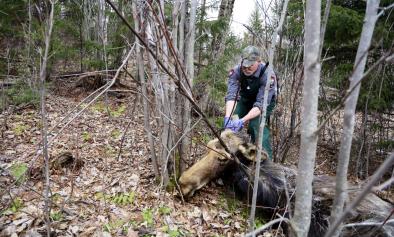Science Source
Physiological stress response of Mountain Whitefish (Prosopium williamsoni) and White Sucker (Catostomus commersoni) sampled along a gradient of temperature and agrichemicals in the Oldman River, Alberta
- States that increasing water temperature is already considered a widespread and problematic stressor in salmonids on the West Coast and displacement of cold-water, northern, high latitude and high altitude species of fish is predicted in many global warming models
- States water temperatures outside the thermal preference range, specifically warmer water temperatures, can cause thermal stress which depletes energy reserves, decreases growth rates, impairs reproduction and changes behavior
- Compares the stress responses of the Mountain Whitefish, (Prosopium williamsoni, a cold-water fish) and White Sucker (Catostomus commersoni, a cool-water fish), along a temperature and pesticide gradient in the Oldman River, Southern Alberta in spring and summer
- Uses plasma acetylcholinesterase activity (AChE) as an indicator of exposure to organophosphate and carbamates pesticides
- Detects important species-specific differences in APlasma acetylcholinesterase ChE activities and responses of the physiological stress axis, suggesting that whitefish are more sensitive to temperature and pesticide stress than suckers
Related Content
Science Source
| Global Change Biology
Decadal-scale phenology and seasonal climate drivers of migratory baleen whales in a rapidly warming marine ecosystem
Daniel E. Pendleton, Morgan W. Tingley, Laura C. Ganley et al
Headline

May 19, 2022 | Climate Nexus Hot News
Climate Change Great For Winter Ticks, Very Bad For Moose Calves
Science Source
Climate change increases cross-species viral transmission risk
Colin J. Carlson, Gregory F. Albery, Cory Merow et al
Science Source
| Journal of Animal Ecology
Climate change affects bird nesting phenology: Comparing contemporary field and historical museum nesting records
John M. Bates, Mason Fidino, Laurel Nowak-Boyd et al


